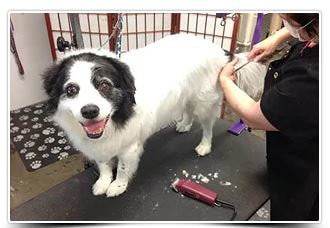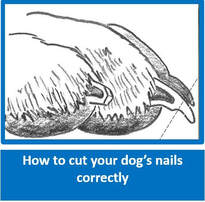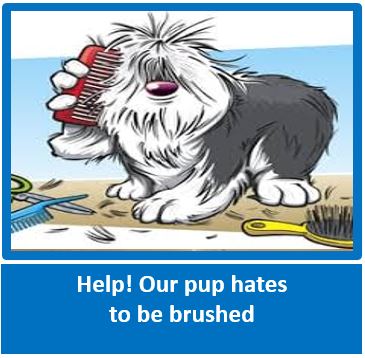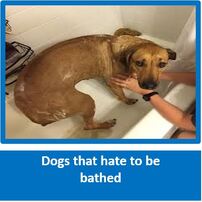
One of the ways, apart from changing your dog's perception of the groomers, to help your dog cope with going to the groomer, is to repeat the exact same routine that the groomer performs. Visit them, ask to watch what happens, and even record the sound of clippers if clippers are used for your dog. Quite simply, the more your dog learns to enjoy being brushed and even washed, the more comfortable he will be, and less likely to stress. Good idea to replicate at least the basic equipment and brush him on a regular basis. That way in addition to learning to enjoy the experience, he will be less likely to develop tangles in his coat. You are welcome to have a look at the wide array of grooming equipment we have available - www.mcmac.co.za
My Dog Struggles at the Vet or Groomer's
www.diamondsintheruff.com
(Some nice articles in above site to go through - enjoy!)
www.diamondsintheruff.com
(Some nice articles in above site to go through - enjoy!)

Pet owners whose dogs are calm and relaxed during veterinary or grooming appointments are more likely to visit the vet or groomer more often. Owners of dogs who are frightened or act out tend to put off routine care and wait until whatever is wrong has been wrong for awhile, making the next visit even more unpleasant. Do you put off trips to the vet or groomer? Why?
Because experiences that are positive are reinforcing and likely to be repeated and experiences that are unpleasant or embarrassing are likely to be avoided.
If your best friend trembles and is distressed, you will tend to avoid situations that make them feel that way. If he growls, if the vet or groomer has to muzzle him, if you are embarrassed about how your pet is behaving or upset about the way your pet is handled, you will avoid being in that situation again.
You can help your dog feel more confident and less stressed in these situations. It will take an investment of time and effort on your part to help your dog feel safe. You may need to transfer to a different groomer or veterinary clinic to get the care that fits your pet's needs. Luckily there are many great ones to choose from. It's worth it to drive a little bit out of your way to find a professional who will work with you and take the time needed to help your pet have a positive experience.
Early socialization helps. The more positive experiences your puppy has early in his puppyhood, the better he will handle difficult situations later in life. A well-socialized puppy will take things in stride much better than his sheltered counterpart. The earlier the better!
Be calm, be confident. Your dog looks to you for security. If you are freaking out, you will freak him out! Your words and actions should convey your confidence in the staff caring for your dog. He trusts you to tell him he can trust them. (If that isn't true, go somewhere else!)
Philosophies and handling techniques vary
- There are great veterinarians and groomers who do their best to provide a low-stress environment and gentle handling.
Unfortunately, there are also veterinarians and groomers who manhandle and force animals into compliance.
A good practitioner will be aware of how your dog is feeling and will help them feel more comfortable before proceeding. They are patient with their patients. They know that a good experience today will make future visits easier. Rushing to get it over with isn't the answer - time well-spent now will make future appointments go faster.
You are your dog's advocate. If you aren't comfortable, say so. Ask for clarification. Ask for time to let your dog regroup if you think your dog needs it. If their interpretation is that your dog is being stubborn, and you know he's resisting because he's afraid, say so. Suggest a different approach. If you aren't okay with what's happening, speak up. Your dog can't. If the practitioner is not treating your pet in the way he deserves, find a new vet or groomer - or trainer!
Your dog's comfort and staff safety must both be a priority. Training & positive associations can help!
Let's face it. There isn't much about medical treatment or being bathed, blow-dried and clipped that is "fun" or comfortable. Staff must be kept safe. The animals they are handling have sharp teeth! It may not be fabulous, but it doesn't have to be unnecessarily traumatic. Which is why so many veterinarians and groomers are learning about Low-Stress Handling Techniques and behavior assessments to help their clients and their animals have a less-stressful experience while in their care. Preparation is up to you! It will take training and practice. You will need to make time to help your dog learn skills and have positive exposure to the sights and sounds of the veterinary clinic and grooming shop. The vast majority of his experiences there should be positive in order to outweigh the parts that aren't. Visit as many vet clinics and grooming shops around town as you can - just to eat amazing, high value rewards in the waiting room. Your dog should love and trust his veterinarian and groomer as much as he trusts you.




